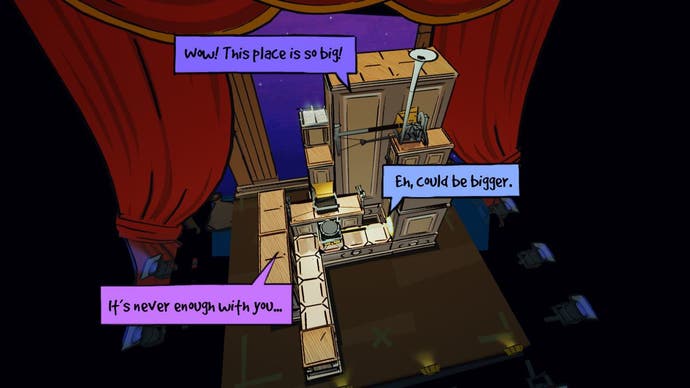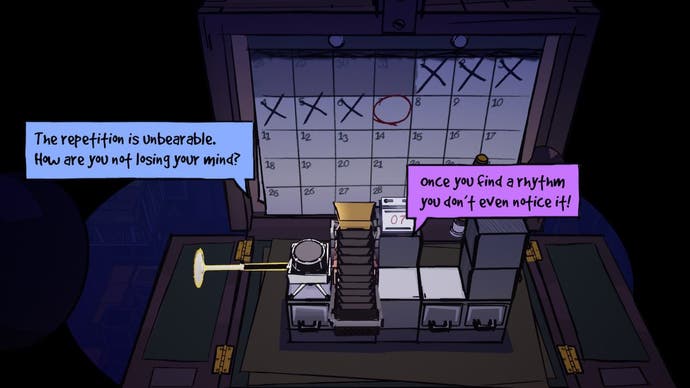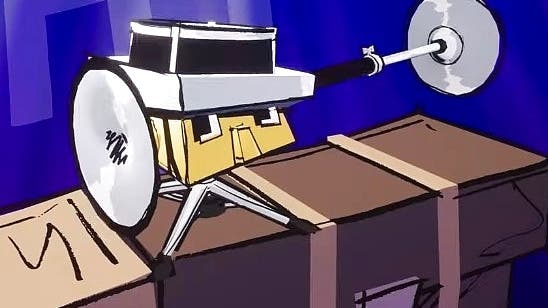Kine review - a jazzy puzzler that's better, and harder, than it looks
Bragtime.
Do you remember those Magic Eye pictures? The ones you had to stare at awkwardly to see hidden pictures in. They took me forever to see. I'd be utterly convinced there was nothing in them, just indecipherable visual noise, then all of a sudden, whoah! I'd see it. I'd get a jolt of excitement as the image was revealed. Then it all seemed a bit trivial because it was staring me in the face the whole time.
Kine is like that. It's a puzzle game that looks really easy but is not. Oohhh boy, it is not. It'll put a puzzle so simple-looking in front of you, something only a few grid-squares big, and you'll be stumped. You'll try every conceivable move and still not be able to solve it. You'll be convinced it's not possible - no solution is there. And then suddenly, you'll see it, one teeny-tiny move you overlooked, and you'll solve it. Then you'll feel a bit sheepish you didn't see it before.
It's really clever how one-woman creator Gwen Frey has hidden devious intricacy in plain sight, because as a result, Kine never appears overwhelming. It's always approachable, inviting you in.
The setting of the game compliments this superbly. It's bizarre at first: you're a robot instrument who wants to play in a band - you're hardly going to want to be a librarian are you? Literally, you are a drum, or an accordion, or a trombone, and you follow your dream by rolling and sliding around a grid area, depending on your shape.
The drum, for instance, resembles a snare and rolls onto its front, back and sides to get around. It also has a cymbal pole attached, which allows it to slide from one end to another, and stand up, a bit like a pole vaulter. This has pros and cons and after about an hour you'll be on top of them. But then the game throws another instrument at you, which moves slightly differently, changing how the game plays a surprising amount. Then, another instrument. It's a lot to wrap your head around. Finally, all three together and your mind pops.
But how can you be frustrated at something which looks so cute? Look at their earnest little faces, and isn't it adorable how they dance along to the jazzy beat? And they talk - what, you didn't think an instrument could talk?

It sounds like a gimmicky theme to dress a puzzle game up in, and I thought it was at first too. But after a while, a clever duality emerges. The story they're telling about learning to play, alone and together, echoes the story of you playing the game.
I first got the feeling that there was something deeper to Kine during a side quest (they're puzzles with themes - there's even one about a love story). In it, the drum and accordion got a job in an office - a tiny space they had to push a box of paper around every day for a month. Literally, you have to push a box of paper around an ever-so-slightly differing space 30 times on the trot.
Naturally, I began to want more. Then I noticed the characters saying things like, "We're capable of more than this," and, "The repetition is unbearable." Even, "Once you settle into a rhythm you won't even notice it." It was exactly what I was thinking.
What's more, they were counting the days down on a big calendar on the screen, just as a real person would in real life. A real person like a musician, working a boring job by day to fund a dream at night. It wasn't Dostoevsky, but wasn't the shallow puzzle game I once mistook it for.

Kine can be fiddly, and on Switch, there can be a slight delay to controls, meaning your brain and fingers sometimes go faster than the game. It's a pain, but as you're never really under any pressure, and never really punished for getting something wrong, you'll forgive it. Plus, there are rewind and restart buttons ready to undo errors or to try things again.
It all adds up to a deceptively delicious package, and a generous one too - there are loads of levels to take on. Kine, like a Magic Eye puzzle, is much more than it initially seems.



